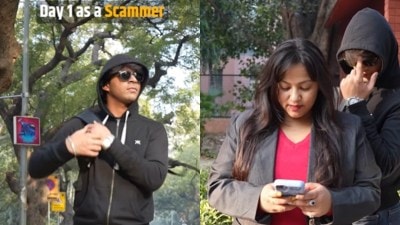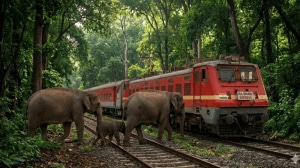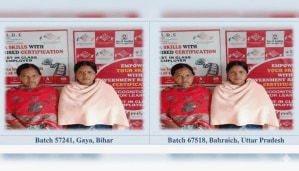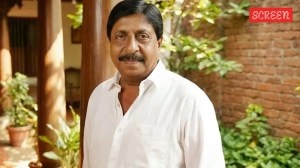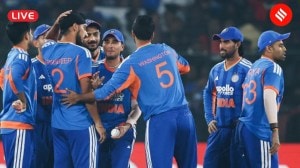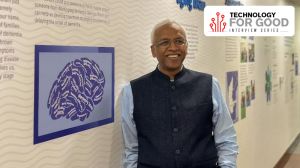Amitabh Kant at Idea Exchange: ‘The IMEC needs to be projectised, de-risked and private sector brought in. It has huge strategic, economic advantage’
Riding on the back of a communique with complete consensus, the New Delhi G20 Leaders’ Declaration makes India’s G20 Sherpa Amitabh Kant the man of the moment.
 India’s G20 Sherpa Amitabh Kant in conversation with Shubhajit Roy, Diplomatic Editor, The Indian Express (Express photo by Gajendra Yadav)
India’s G20 Sherpa Amitabh Kant in conversation with Shubhajit Roy, Diplomatic Editor, The Indian Express (Express photo by Gajendra Yadav) India’s G20 Sherpa Amitabh Kant on drafting the joint communique which got 100 per cent consensus, delivering a win-win on the Ukraine question, and the green development pact. The session was moderated by Shubhajit Roy, Diplomatic Editor, The Indian Express
Shubhajit Roy: This G20 summit adopted a joint communique with consensus. What happened in the last 72 to 96 hours before the summit declaration was adopted?
We were very clear that we should have a consensus-based document. By the time we had gone in for the final round of the Sherpas’ meetings, we had agreed on a substantial amount of text. We did this almost 60 km away from Delhi, in Manesar. On September 4, we started discussing the geopolitical paragraph on Russia-Ukraine. That was the most complex… We kept the meeting on the morning of September 8 in Sushma Swaraj Bhavan, because, by then, the leaders started coming in. We gave them one draft, to which there were different viewpoints. We modified that and it went to Moscow and came back with many comments, and then we finally worked on that late evening. Then at 11.30 at night, we had our last round of Sherpa meetings, and said this is the final draft. I also told them that this would not be discussed anymore at the Sherpa level. If anyone wants to challenge this, their leader can discuss it with my leader, my prime minister… We were negotiating an agreement which even the United Nations Security Council was not able to achieve. We have a consensus language, which we feel is very strong. It moves the debate towards diplomacy and dialogue. It happened over 200-odd bilateral meetings and 16 formal meetings, through tough, brutal negotiations.
I think our G20 was very, very different from any other country. It was PM Modi’s stature and standing that ensured the complete consensus. He had directed an inclusive, action-oriented and consensus-driven G20
Shubhajit Roy: The UN Secretary-General recently said that it was a compromise document. It’s a formulation of a compromise — Russia has not been condemned and has not been called out for aggression.
The important thing was to get everybody on the table. Russia was asking for many other things. The US and G7 were asking for other things. But we made everybody step back. This is what India was able to do. India was able to bring G7, emerging markets, Russia, China and everybody to the table to agree. We moved in to say that the final solution has to be a diplomatic solution, not a military one. Everybody stepped back for peace, security and for food supplies to resume. This is a far tougher language than Bali. Bali did not say that you will not use territorial acquisition nor (did it) focus on territorial integrity, and it did not talk about sovereignty or political independence. This is the first time these basic principles of the UN Charter have been used in the first paragraph itself.
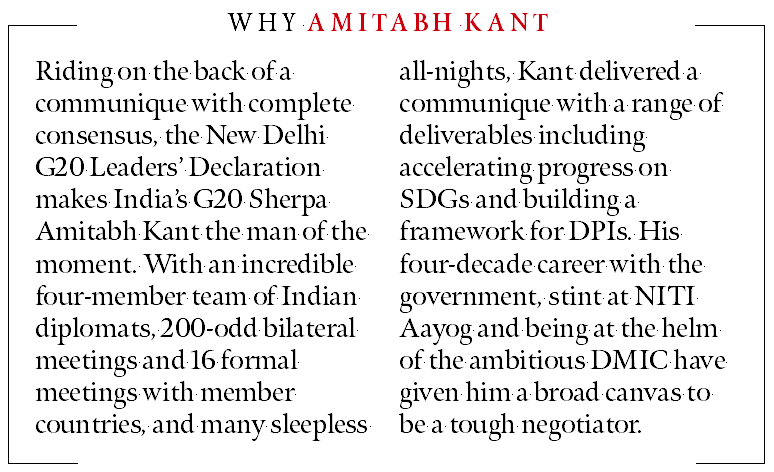
Shubhajit Roy: What changed China’s mind because there was a sense that consensus could be elusive since President Xi Jinping was not coming?
Whatever the bilateral challenges, China is a big-time multilateral player and it plays multilateral games in international forums. Once they realised that there are 19 countries supporting us on Vasudhaiva Kutumbakam and women-led development, you could bilaterally talk to them. China joined us in saying that all emerging markets should work towards a consensus… We worked on our terms and got everybody around because we spoke the voice of the Global South and of the developing countries. This is one document which talks about developing countries from the preamble to the last.
Shubhajit Roy: How did the government arrive at this Global South construct and the African Union’s inclusion?
The Prime Minister had started the G20 with a meeting of the voice of the Global South. Of the 125 countries that participated, we listened to all of them. Each one of our priorities was based on accelerating strong, sustainable and inclusive growth… After the Prime Minister had written to all the leaders about making the African Union a permanent member of G20, there was an overwhelming response. There were other regions and other associations, which also wanted to become a part of this.
Shubhajit Roy: There was a sort of expectation from some of the countries, mostly G7, that Ukraine would be invited as a guest country. How did that play out?
There was a lot of pressure. We just held firm. India was absolutely clear that it should be a meeting of G20.
It’s a voice of moderation. It’s a call for peace. It demonstrates very clearly that the eventual solution will lie in diplomacy. It will not lie in military offensives… India’s G20 presidency is really a voice for multilateralism
Story continues below this ad
Shubhajit Roy: When you have nine countries as invitees, why not?
The issues of growth and progress for all developing countries in the Global South are far more important than getting sucked into the Russia-Ukraine war. That’s not a creation of the developing countries. We got sucked into World War I and II. We should try and avoid getting into the Russia-Ukraine war.
Shubhajit Roy: Will this particular paragraph formulation have an impact on the negotiations for the war?
It’s a voice of moderation. It’s a call for peace. It demonstrates very clearly that the eventual solution will lie in diplomacy. It will not lie in military offensives… India’s G20 presidency is really a voice for multilateralism. We’ve tried to move away from it being driven into one single issue, of Russia-Ukraine.

Shubhajit Roy: What are the two or three big takeaways from this document?
The green development pact is very important. It brings the focus on tripling renewable energy, circular economy, ending plastics and disaster-risk resilience. Secondly, we’ve used the G20 presidency to create an alternative model from big tech, to give a definition and framework for DPIs (digital public infrastructure). Thirdly, no document of any multilateral institution has had such a huge focus on women empowerment, gender equality, and women-led development as this document has.
Shubhajit Roy: Did S Jaishankar have a role in this?
Of course. He’s a brilliant external affairs minister, a great strategist. I was constantly taking his advice. He’s been a big help. He’s my senior from JNU.
We got sucked into World War I and II. We should try and avoid getting into the Russia-Ukraine war… The issues of growth and progress for developing countries in the Global South are far more important
Story continues below this ad
Harikishan Sharma: One of the initiatives in the food and nutrition sector was the Deccan High Level Principles on Food Security and Nutrition. How do you see these principles translating into action?
There is a huge Indian narrative in this, one of which is the Deccan High Level Principles. Secondly, what India has brought to G20 is the focus on education, health and nutrition. Post-COVID, 200 million people have gone below the poverty line and 100 million people have lost their jobs. We’ve brought in a complete action plan for the 2030 Sustainable Development Goals, which is really the job of the United Nations. The virtual summit in November (which India will hold) will be a stocktaking of the implementation of what has been accepted by the New Delhi Leaders’ Declaration.
Shubhajit Roy: Are there any big things you have in mind under India’s presidency till November?
We are looking at several things including how the Jan Bhagidari part can still carry on. There’s a lot we want to do on women-led development.
 India’s G20 Sherpa Amitabh Kant. (Express photo by Gajendra Yadav)
India’s G20 Sherpa Amitabh Kant. (Express photo by Gajendra Yadav)
Aanchal Magazine: We believe China had opposition to any debt package having climate-resilient features. Saudi Arabia also had objections, and the word ‘climate’ was dropped. How are those negotiations done?
The important thing is to push for renewables. It was for the first time that we’ve talked about tripling renewable energy, about the requirement of scaling up financing, which has come into the preamble of the green development pact.
Vandita Mishra: This G20 consensus declaration brings two things into sharp relief. One is this emphasis on consensus abroad, while that seems to be very much missing at home. The other is this whole casting of the G20 as a much wider political public event than it has ever been so far.
India has done its G20 presidency very differently from other countries. The Prime Minister was very clear that you have to make it a people’s presidency; not restrict it to Delhi, but hold it in every state. So, we held it in 60 cities of India. We used that opportunity to clean up the drainage, the sewer, the solid waste, and improve infrastructure. We’ve allowed states to build up their brand… So, I think our G20 was very, very different from any other country where it has been restricted to a capital or second city…
It was PM Modi’s stature and standing that ensured the consensus. He had directed an inclusive, action-oriented and consensus-driven G20. We’ve demonstrated that G20 is not about developed countries, but it’s about growth and progress, about social sectors, about sustainable development goals.
And about your first question, I’m not a politician. So, I don’t want to respond to it.
 India’s G20 Sherpa Amitabh Kant. (Express photo by Gajendra Yadav)
India’s G20 Sherpa Amitabh Kant. (Express photo by Gajendra Yadav)
Shubhajit Roy: Ukraine president’s presence was one of the red lines, but were there any others?
There were many other red lines. Every country had one. Some on nuclear; Russia too had a red line. But, we pushed everyone towards a common language. This is a far stronger language than Hiroshima plus partners’ language of the G7.
Aakash Joshi: You mentioned DPI many times, but critics have often pointed out that it somehow doesn’t square with the fact that we are the country with the highest number of internet shutdowns. How do you square these two things?
First, let me talk about DPIs because it’s important to delink them. They are two separate issues. One is the fact that everybody in India has a digital identity. Secondly, it’s important to understand that between 2015 and 2017, India opened more than 500 million bank accounts, which was 55 per cent of the bank accounts opened across the world. And every second bank account that was opened, was seeded with Aadhaar and a mobile number. That brought down the cost of customer acquisition very low; from about $150 to almost $1 per customer. It led us to fast payments; we are today doing 11x more payments than what USA and Europe do, and 4x of what China does. As a consequence, many startups started giving credit which is paperless and cashless. Startups then took the stock market into rural areas. You now have a number of new-age startups which are unicorns, which are enabling insurance in less than a minute… On the question about the internet shutting down, I think we should improve over a period of time. I’m a believer that it must improve.
Shubhajit Roy: Were there concerns when the meetings were in Kashmir?
We had excellent participation. G20 in Kashmir has been a remarkable success story. I think the city has improved radically. The smart-city concept in Srinagar has been brilliantly executed.
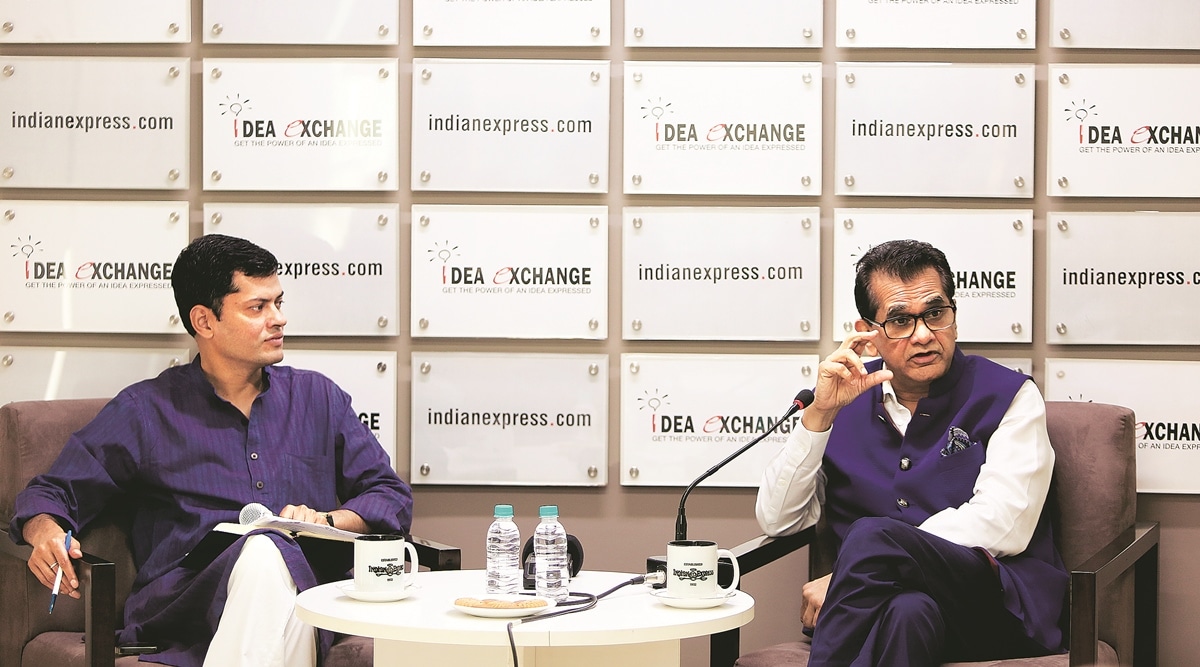 India’s G20 Sherpa Amitabh Kant in conversation with Shubhajit Roy, Diplomatic Editor, The Indian Express (Express photo by Gajendra Yadav)
India’s G20 Sherpa Amitabh Kant in conversation with Shubhajit Roy, Diplomatic Editor, The Indian Express (Express photo by Gajendra Yadav)
Sukalp Sharma: The elimination of fossil fuels was missing in the declaration. What is India’s stance?
India’s stance was that the world must move towards green hydrogen. See, even if we have 100 per cent of our electricity as renewable, it’s only 20 per cent of energy. The balance 80 per cent is all hard-to-abate sector — refineries, fertiliser, steel, cement — that needs to be decarbonised.
Sukalp Sharma: And how do you see the declaration feeding into COP28, considering that G20 countries account for 80 per cent of global emissions?
Many things, especially green hydrogen, biofuel alliance, and tripling of renewable energy will get accelerated in COP 28.
Amitabh Sinha: Do you see the Global Biofuels Alliance shaping up on the lines of the International Solar Alliance? Would you also want the Biofuels Alliance to be housed in India?
So, Biofuel Alliance is likely to be housed in India. It’s very ambitious. It’s almost on par with the International Solar Alliance, where USA-Saudi, USA-Brazil, which is a major biofuel producer, have collaborated with India to push this Biofuel Alliance. But, it is still a work in progress.
Amitabh Sinha: Some of the language is specifically on tripling of renewable energy and the global biofuels. Is India going to push for the inclusion of a similar kind of language in COP28?
Well, I don’t want to prematurely talk about COP28… Our calculation shows that by 2030, we should be able to do much more than tripling of renewable energy. We are the only country in the world which has achieved 185 gigawatt of power.
Amitabh Sinha: We should be able to do tripling from what base?
From the original base. The only other country which has a similar climatic condition as India, or probably better, is Saudi. Saudi should move towards cleaner forms of fuel rather than fossil fuels.
Shubhajit Roy: In Para 78, there’s a very strong line about deploring all acts of religious hatred. How did this come about?
This came in because of Saudi and Indonesia; many countries wanted this in. That’s how the para which we wanted on counterterrorism and not providing safe haven came in.
Anil Sasi: On the India-Middle East-Europe Economic Corridor (IMEC), what are the next steps?
It’s a work in progress. It needs to be fully projectised and de-risked. Then, the private sector needs to be brought in. It’s big in its concept, and has a huge strategic and economic advantage for India.
Shubhajit Roy: It’s a very ambitious project, but people who’ve analysed it say that economics and connectivity probably don’t support it as yet.
I’ve worked on this Delhi-Mumbai Industrial Corridor, the DFC… These are projects which have to be ambitious in nature, but they start acquiring a life of their own. It will radically transform the region, and India will be a very big beneficiary.
Aanchal Magazine: Artificial Intelligence has found a mention in the declaration. Were there larger concerns raised by leaders?
Many leaders raised that issue on how AI must not be used for human harm. Some leaders spoke of how it can be transformational for social sectors, while other leaders felt that it’s still at an evolutionary stage. There were many views on this.
Shubhajit Roy: Is this the toughest job that you’ve had in the last 40 years?
Undoubtedly, this was very tough because you were negotiating with 29 countries, 43 leaders, plus all international organisations. And all top-class professionals, all really brutal negotiators. It’s not easy.
Shubhajit Roy: So what next? Cabinet minister?
No, I am not interested in politics. I just want to travel around India, read and write.
Harikishan Sharma: Modi believes more in bureaucrats than his political leaders. So, do you see a bigger responsibility for you?
I’ve had a very long innings in government. I’ve been working for almost 44 years now. So, I have no ambition to get into politics or any such thing.
- 01
- 02
- 03
- 04
- 05


